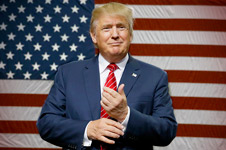With US Secretary of State, Rex Tillerson, scheduled to visit Wellington this week, it is clear New Zealand's interests and values are challenged by the Trump administration's world view.
However, in an opinion piece published on stuff.co.nz and reproduced here on the Otago Bulletin Board, University of Otago Professor of International Relations Robert Patman argues that it is possible for Wellington to maintain friendly ties with Washington while frankly acknowledging the policy differences between the two sides.

US President Donald Trump.
The Trump administration's world view, which emphasises resistance to globalisation and multilateral institutions – particularly in relation to immigration, trade and governance – cuts a stark contrast with a forward-leaning New Zealand foreign policy perspective that views globalisation as a transformative change, driven by technology, which has helped to advance New Zealand's position on the international stage.
More specifically, the Trump administration's early actions cut across four aspects of New Zealand's foreign policy posture.
First, in terms of national identity, and at a time when New Zealand has redefined itself in the world itself by recognising the special constitutional and cultural position of Maori people and expanding ties with the Asia-Pacific, Trump's brand of nationalism appears to have weakened America's commitment to international human rights and the rule of law.
President Trump has attempted to introduce a temporary travel ban against citizens from 7 Middle Eastern countries and exclude Syrian refugees, re-affirmed his commitment to build a border wall with Mexico, and begun the process of repealing the Affordable Health Care Act, which extended health care insurance to 20 million disadvantaged Americans.
Second, since a programme of radical reform in the mid-1980s had made the New Zealand economy one of the most open in the developed world, all New Zealand governments have identified trade liberalisation as a crucial ingredient in increasing the country's economic growth and prosperity.
However, the new Trump administration does not seem to share this goal. In January 2017, Washington announced its withdrawal from the Trans-Pacific Partnership (TPP). This was a major blow to Wellington.
Historically, New Zealand governments have been trying for years to secure a bilateral free trade agreement with Washington, and played a leadership role in advancing the idea of the TPP, a multilateral trade agreement encompassing the US and 11 other states from the Asia-Pacific region.
Third, the advent of the Trump administration has the potential to complicate New Zealand's much improved security relationship with the US.
While Prime Minister Bill English supported President Trump's missile strike against the Assad regime following its illegal use of chemical weapons in the Syrian civil war and welcomes greater diplomatic co-ordination between the President Trump and China's President Xi Jinping in curbing the nuclear weapons ambitions of the Kim Jong Un's regime in North Korea, the absence of a coherent strategic vision in Trump's White House is disconcerting for an ally like New Zealand.
President Trump's tactical opportunism – in the space of five months in office he has changed his mind on NATO, the EU, China, Syria and Russia – raises troubling questions about the degree of American support for commitments like the New Zealand deployment of 143 military personnel in Iraq.

Professor Robert Patman.
Fourth, New Zealand's 'can do' approach to multilateral diplomacy sits uncomfortably with the Trump administration's realpolitik. Unlike Britain and Australia, New Zealand has been less inclined to believe that the globalised liberal order is exclusively dependent on the power of the United States.
But the Trump team seems to exemplify the view "the strong rule where they can and the weak suffer what they must". And this may mean, as Trump recently demonstrated, the US walking away from the 2015 Paris agreement on climate change.
Moreover, the diplomatic task of managing New Zealand's close relationship with both US and China could become more difficult with New Zealand facing the prospect of greater pressure to align more closely with Washington.
How should New Zealand respond to the Trump administration? For one thing, New Zealand must not abandon its core foreign policy beliefs centred on its support for the UN and a rules-based order in the vain hope that it can appease the Trump administration.
Unfortunately, there may already be some fraying here with the new New Zealand Foreign Minister, Gerry Brownlee apparently distancing himself from his government's previous co-sponsorship of UNSC 2334, which condemned Israel's programme of settlements in East Jerusalem and the West Bank.
But the costs of such short-term diplomatic manoeuvring far outweigh the benefits. It should not be forgotten that differences over New Zealand's non-nuclear security policy did not prevent eventual rapprochement between Wellington and Washington after 9/11.
Besides, the New Zealand government will be aware the current leaderships of the UK and Australia have already drawn domestic criticism for being too subservient to the Trump administration.
New Zealand should avoid tilting too heavily towards either the US or China, and it must also continue to diversify its efforts to expand its relationships, particularly in the Asia Pacific.
Such diversification helps to prevent a New Zealand fixation with the US-China relationship, and reminds the two superpowers that they are not the only shows in town. Pressing ahead with the TPP without the US is one way of doing this.
At the same time, New Zealand should not allow its view of the United States to be dominated by the Trump administration.
America was an important partner before the Trump administration and is likely to remain one during the post-Trump era. The two countries share democratic political values, significant economic ties, military and intelligence links and close social-cultural relations.
In the circumstances, it makes sense for the New Zealand to pursue a two-track policy approach towards the Trump administration.
On the one hand, Wellington must vigorously uphold its support for its core foreign policy goals. Having recently completed a high-profile two-year stint on the UNSC, it is important that New Zealand does not back off the foreign policy commitments it made there simply to accommodate the Trump team.
On the other hand, New Zealand should make it very clear that it wants a warm and co-operative relationship with Washington, and is prepared work hard to achieve that where there is common ground between the two sides.
